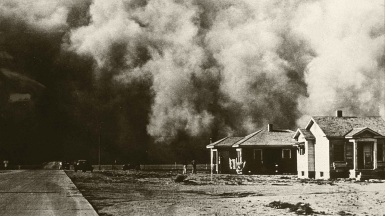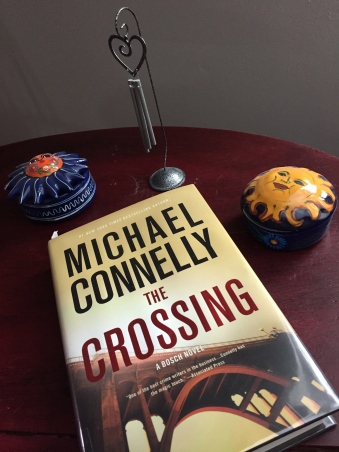The work on our upstairs bathroom proceeds. We knew it would take weeks, and that there would be workers in the house during that time, and that we’d need to use the downstairs bathroom, but the project had one byproduct I didn’t fully anticipate.
Dust. Lots and lots of dust.
 When the tile was removed from the drywall in the bathroom, it produced dust. So did pulling down the drywall. So did prying off the floor tile, removing the shower basin and toilet, and taking the medicine cabinet off the wall. I’ve concluded that most bathroom fixtures and coverings must be made of about 90 percent compacted dust.
When the tile was removed from the drywall in the bathroom, it produced dust. So did pulling down the drywall. So did prying off the floor tile, removing the shower basin and toilet, and taking the medicine cabinet off the wall. I’ve concluded that most bathroom fixtures and coverings must be made of about 90 percent compacted dust.
And here’s another fun fact about dust that I’ve learned: dust is adventurous. Dust likes to explore. Dust apparently wasn’t happy about being trapped in the bathroom for all those years, and now it wants to get out and see the world — or at least the upstairs of our house. And dust must be curious, too, because it seems to be ending up in virtually every nook and cranny of our upstairs sitting room and bedroom and closets.
Every night when I walk upstairs, I enter the dust zone, and I think of the Oklahoma Dust Bowl of the 1930s and photographs of thin, sad-eyed women holding babies and children and staring forlornly into the distance. There’s a fresh layer of fine dust everywhere, on the floor, on chairs, on my desk, and on the clothes in my closet. We’re probably being covered with dust as we sleep, too.
But here’s the worst part — every time I see the dust, the Kansas song Dust in the Wind runs through my head. It’s unquestionably one of the most morose, whiny, annoying songs ever recorded. What could be worse that coming home from a hard day’s work and hearing Dust in the Wind, over and over again? (Well, I suppose hearing Gordon Lightfoot’s The Wreck of the Edmund Fitzgerald, but that’s a bit off topic.)
I’ll be glad when the bathroom project ends, and we can shake the dust off and move on.

 When the tile was removed from the drywall in the bathroom, it produced dust. So did pulling down the drywall. So did prying off the floor tile, removing the shower basin and toilet, and taking the medicine cabinet off the wall. I’ve concluded that most bathroom fixtures and coverings must be made of about 90 percent compacted dust.
When the tile was removed from the drywall in the bathroom, it produced dust. So did pulling down the drywall. So did prying off the floor tile, removing the shower basin and toilet, and taking the medicine cabinet off the wall. I’ve concluded that most bathroom fixtures and coverings must be made of about 90 percent compacted dust. Take Grandpa Neal. He first voted for President in 1920, for Warren G. Harding, and I’m confident he voted Republican in every presidential election for the next 76 years, making his last vote for Bob Dole in 1996. After the 1968 election, he proudly displayed a plaque he received for his contribution to the Nixon campaign on his bookshelf. He was a banker who voted Republican because he thought it was the party of fiscal responsibility, growth, and individual initiative, the party of prudent foreign and domestic policy that didn’t go in for the flash and dash of the Ds. The Republican Party and its sober image fit him to a T. He was a modest paragon of propriety, always carefully dressed and primly mannered, with no flashes of crude humor. He and Grandma Neal slept in separate twin beds.
Take Grandpa Neal. He first voted for President in 1920, for Warren G. Harding, and I’m confident he voted Republican in every presidential election for the next 76 years, making his last vote for Bob Dole in 1996. After the 1968 election, he proudly displayed a plaque he received for his contribution to the Nixon campaign on his bookshelf. He was a banker who voted Republican because he thought it was the party of fiscal responsibility, growth, and individual initiative, the party of prudent foreign and domestic policy that didn’t go in for the flash and dash of the Ds. The Republican Party and its sober image fit him to a T. He was a modest paragon of propriety, always carefully dressed and primly mannered, with no flashes of crude humor. He and Grandma Neal slept in separate twin beds. Instead, five years ago the hunters found . . . a puppy, still locked in the ice but apparently perfectly preserved.
Instead, five years ago the hunters found . . . a puppy, still locked in the ice but apparently perfectly preserved. It was.
It was.  Years ago, the Philosopher King of the Fifth Floor recommended the Bosch books to me. They’re a series — I’m not sure how many there are now — that follow the career and exploits of Hieronymus (“Harry”) Bosch, a long-time police detective with the Los Angeles Police Department. I started with the first in the series and was immediately hooked, and ever since I’ve happily followed the jazz-loving, uncompromising Harry through multiple partners, tragic deaths, love affairs, family dramas, political intrigue in the LAPD, and countless other back stories as he searches for clues and carefully solves grisly murders. It’s been a terrific series.
Years ago, the Philosopher King of the Fifth Floor recommended the Bosch books to me. They’re a series — I’m not sure how many there are now — that follow the career and exploits of Hieronymus (“Harry”) Bosch, a long-time police detective with the Los Angeles Police Department. I started with the first in the series and was immediately hooked, and ever since I’ve happily followed the jazz-loving, uncompromising Harry through multiple partners, tragic deaths, love affairs, family dramas, political intrigue in the LAPD, and countless other back stories as he searches for clues and carefully solves grisly murders. It’s been a terrific series. Combine those facts with the overall perception that Europe is struggling to deal with the latest flood of immigrants from the Middle East and didn’t effectively screen the incoming refugees, that Muslims in Europe are not integrated into European society, and that the European police forces haven’t done a very good job of identifying and tracking terrorists, and it’s not surprising that people are deciding that now is not the time to venture across the Atlantic. And when you read that European police efforts are handicapped by laws that seem motivated more by political correctness than by an honest effort to promote security — like
Combine those facts with the overall perception that Europe is struggling to deal with the latest flood of immigrants from the Middle East and didn’t effectively screen the incoming refugees, that Muslims in Europe are not integrated into European society, and that the European police forces haven’t done a very good job of identifying and tracking terrorists, and it’s not surprising that people are deciding that now is not the time to venture across the Atlantic. And when you read that European police efforts are handicapped by laws that seem motivated more by political correctness than by an honest effort to promote security — like  Kish, Kasey and I were walking back from the library this afternoon in the bright sunshine when we passed this beautiful, candy-colored Chevrolet Bel Air station wagon. Check out the white sidewalls, the gleaming paint job, the wide grille, the acres of shiny chrome, and that hood ornament. I’m guessing it’s a 1956 model.
Kish, Kasey and I were walking back from the library this afternoon in the bright sunshine when we passed this beautiful, candy-colored Chevrolet Bel Air station wagon. Check out the white sidewalls, the gleaming paint job, the wide grille, the acres of shiny chrome, and that hood ornament. I’m guessing it’s a 1956 model.
 So when
So when  The point of this North Carolina law enforcement initiative apparently is to disabuse drivers of the notion that there is some sort of safe speed above the posted limit that you can drive without getting pulled over and cited. The news story linked above says the common belief is that so long as you are going less than 10 m.p.h. over the speed limit, you’re okay. Nope, says the North Carolina Department of Transportation: in this new campaign, they’ll be ticketing anyone going even one mile an hour above the posted limit.
The point of this North Carolina law enforcement initiative apparently is to disabuse drivers of the notion that there is some sort of safe speed above the posted limit that you can drive without getting pulled over and cited. The news story linked above says the common belief is that so long as you are going less than 10 m.p.h. over the speed limit, you’re okay. Nope, says the North Carolina Department of Transportation: in this new campaign, they’ll be ticketing anyone going even one mile an hour above the posted limit. I’ve loved this quote ever since I first read it, in one of the Will Durant’s volumes on Civilization. It’s pithy, and it brilliantly captures that world weariness that you sometimes feel when you’re on the treadmill at work and you feel like there is nothing new under the sun and you’re absolutely going to scream if somebody walks into your office and gives you another mundane chore.
I’ve loved this quote ever since I first read it, in one of the Will Durant’s volumes on Civilization. It’s pithy, and it brilliantly captures that world weariness that you sometimes feel when you’re on the treadmill at work and you feel like there is nothing new under the sun and you’re absolutely going to scream if somebody walks into your office and gives you another mundane chore. Some municipalities have increased the minimum wage anyway. So, how is it working? While the data is preliminary, it seems to show what any rational person would suspect — that minimum wage increases affect hiring. A
Some municipalities have increased the minimum wage anyway. So, how is it working? While the data is preliminary, it seems to show what any rational person would suspect — that minimum wage increases affect hiring. A  I’m quite sure that we’re not unusual in knowing and working with Muslims. America still remains a melting pot where people of different nationalities, colors, and faiths can come and pursue their dreams, without being shackled by caste systems or tribal ancestry or corrupt political systems. In America, a person’s religious faith is just one aspect of their persona. It doesn’t immutably define them, and it certainly shouldn’t cause them to be targeted.
I’m quite sure that we’re not unusual in knowing and working with Muslims. America still remains a melting pot where people of different nationalities, colors, and faiths can come and pursue their dreams, without being shackled by caste systems or tribal ancestry or corrupt political systems. In America, a person’s religious faith is just one aspect of their persona. It doesn’t immutably define them, and it certainly shouldn’t cause them to be targeted. Am I the only person who has had it with this kind of empty symbolism? I guess we’re all supposed to be deeply moved by the projection of the Belgian flag. Hey, while we’re at it, let’s have a Facebook app that allows us to change our profile pictures to use the Belgian colors! And maybe we can come up with a few good Twitter hashtags, too, like when the primary response to the African terrorists who were kidnapping young girls and selling them into slavery was a “freeourgirls” hashtag? Boy, a really good hashtag will teach those ISIS guys not to mess with us!
Am I the only person who has had it with this kind of empty symbolism? I guess we’re all supposed to be deeply moved by the projection of the Belgian flag. Hey, while we’re at it, let’s have a Facebook app that allows us to change our profile pictures to use the Belgian colors! And maybe we can come up with a few good Twitter hashtags, too, like when the primary response to the African terrorists who were kidnapping young girls and selling them into slavery was a “freeourgirls” hashtag? Boy, a really good hashtag will teach those ISIS guys not to mess with us!